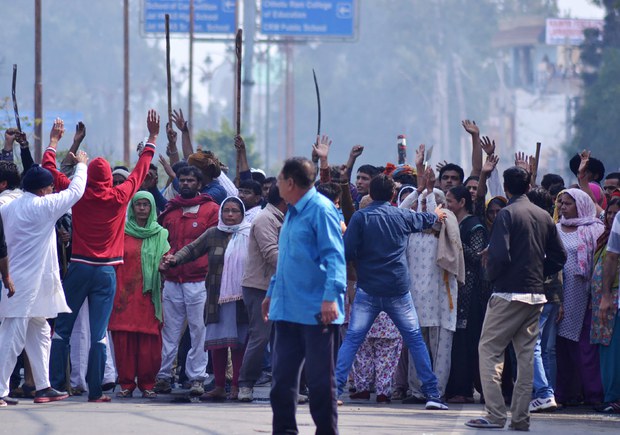India: Jats Threaten to Intensify Protests over Government Jobs
2017.02.21
New Delhi
 Residents gather on a street as others gesture to hold them back during a protest by Jats in Rohtak, Haryana, Feb. 20, 2016.
Residents gather on a street as others gesture to hold them back during a protest by Jats in Rohtak, Haryana, Feb. 20, 2016.
A socially disadvantaged Hindu group that has blocked roads in Haryana state since mid-January on Tuesday threatened to intensify protests if a demand for 10 percent of quotas for government jobs and admission to state-run colleges is not accepted.
The Jat community, which is concentrated mostly in Haryana, has been staging rallies in 20 districts of the northern state as well as the neighboring regions of Delhi and Uttar Pradesh since Jan. 17, the group’s leader said.
“We are protesting the government’s attempt to suppress voices in the Jat community. In the coming days we will intensify our agitation against the ruling coalition,” Yashpal Malik, president of the All India Jat Arakshan Sangharsh Samiti (AIJASS), told BenarNews, referring to India’s ruling Hindu nationalist Bharatiya Janata Party (BJP).
A similar Jat agitation that kicked off in February 2016 left more than 30 dead and 300 others injured in Haryana, Malik said, adding that he hoped the group’s latest agitation would remain peaceful.
“On Feb. 26, we will observe a black day against the government of Haryana. Then on March 1, we will launch a non-cooperation movement against both the state and the central government, following which we will march toward the parliament with the intention of blockading New Delhi,” Malik said.
On Monday, Jat leaders urged community members to not pay their utility bills and bank loans as part of the non-cooperation movement. They also asked dairy farmers in Haryana to stop the supply of milk to the national capital to mount pressure on the government.
“The government has been bluffing us for too long. We cannot let this happen. Our people would raise every kind of resentment and protest. We are only asking for jobs for our children,” Malik said.
Seeking larger quotas
The government and the protesting Jats were unable to reach a consensus when they attempted to resolve the issue Monday, Malik said, adding the government did agree to form a four-member panel to examine the group’s demand of withdrawing criminal cases against Jats during last year’s violence.
The scheme of caste-based quotas in Indian educational institutions, government jobs and promotions was implemented in 1990 following a recommendation from the Mandal Commission, which the government appointed to assess the situation of socially and educationally disadvantaged groups.
According to the current quota system, 15 percent of seats in government jobs and colleges are reserved for Scheduled Castes (SC) and 7.5 percent for Scheduled Tribes (ST), besides 27 percent for Other Backward Classes (OBC) and 3 percent for people with disabilities, totaling 52.5 percent. The Jats want to be included in the OBC category.
Although the Supreme Court has capped the caste-based quota at 50 percent, several states exceed this limit and are under litigation before the apex court.
Protester slapped with sedition
On Monday, the police brought sedition charges against one of the protesters who allegedly threatened to behead Prime Minister Narendra Modi.
“If you say, we will behead Modi but won’t let you down,” the accused, Som Bir, reportedly said while addressing protesters in Rohtak district on Sunday.
The sedition charge has further enraged the community, Satpal Malik, an Uttar Pradesh-based Jat reservation activist, told BenarNews.
“The BJP government’s attitude is very sick toward our demands. They are practicing suppression on us,” he said.
“Our demands and agitation are within the scope of the Indian constitution. We are not doing anything unconstitutional. The government is trying to suppress us. But it should dare not hope to get away with it,” he added.
The BJP, however, said it was not its responsibility to accept or reject demands of quotas for any particular community.
“The BJP has always supported the inclusion of Jats in the OBC category. But there is a general parameter for all castes, and it has to be carefully studied for each one of them differently,” BJP spokesman Bizay Sonkar Shastri told BenarNews.
“The government cannot do anything in this matter. The job has been assigned to the OBC Commission which normally seeks a report from the RGI (Registrar General of India) and the state government on the historical background of a particular community and their present social, economic and educational status. The commission has to authorize [this] before any action of any kind could be taken,” he said.







